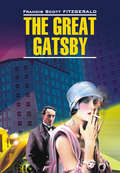
Фрэнсис Скотт Фицджеральд
Великий Гэтсби / The Great Gatsby (на русском и английском языках)
Chapter 2
One day I met Tom Buchanan’s mistress. Yes, Tom Buchanan had a mistress. He visited popular restaurants with her and, leaving her at a table, wandered about, chatting with whomsoever he knew. Though I was curious to see her, I had no desire to meet her-but I did. I went up to New York with Tom on the train one afternoon and when we stopped he jumped to his feet and forced me from the car.
“We’re getting off!” he insisted. “I want you to meet my girl.”
He definitely decided to have my company. He thought that on Sunday afternoon I had nothing better to do. I followed him over a low white-washed railroad fence. I saw a garage-Repairs. GEORGE B. WILSON. Cars Bought and Sold-and I followed Tom inside.
The interior was bare; the only automobile visible was the dust-covered Ford which stood in a dim corner. The proprietor himself appeared in the door of an office, wiping his hands on a piece of waste. He was a blonde, spiritless, faintly handsome man.
“Hello, Wilson, old man,” said Tom, slapping him on the shoulder. “How’s business?”
“I can’t complain,” answered Wilson. “When are you going to sell me that automobile?”
“Next week. My man is working on it now.”
“He is working pretty slow, right?”
“No, he isn’t,” said Tom coldly. “And if you think so, maybe I’d better sell it somewhere else after all.”
“I don’t mean that,” explained Wilson quickly. “I just meant…”
Tom glanced impatiently around the garage. Then I heard footsteps on a stairs and saw a woman. She was in the middle thirties, and faintly stout, but she carried her surplus flesh sensuously as some women can. She smiled slowly and walking through her husband as if he were a ghost shook hands with Tom. Then she spoke to her husband in a soft, coarse voice:
“Get some chairs, why don’t you, so somebody can sit down.”
“Oh, sure,” agreed Wilson hurriedly and went toward the little office.
“I want to see you,” said Tom intently. “Get on the next train.”
“All right.”
“I’ll meet you by the news-stand.”
She nodded and moved away from him. George Wilson emerged with two chairs from his office door.
We waited for her down the road and out of sight.
“Terrible place, isn’t it?” said Tom.
“Awful.”
“It does her good to get away.”
“Doesn’t her husband object?”
“Wilson? He thinks she goes to see her sister in New York. “
So Tom Buchanan and his girl and I went up together to New York-or not quite together, for Mrs. Wilson sat discreetly in another car. At the news-stand she bought a copy of Town Tattle and a magazine, and in the station drug store some cold cream and a small flask of perfume. Then said, pointing at the grey old man with a basket.
“I want one of those dogs,” she said. “I want to get one for the apartment. They’re so nice.”
In a basket the grey old man had pretty puppies.
“What kind are they?” asked Mrs. Wilson.
“All kinds. What kind do you want, lady?”
“I’d like to get one of those police dogs[2]; do you have that kind?”
The man peered into the basket, plunged in his hand and drew one up, by the back of the neck.
“That’s no police dog,” said Tom.
“No, it’s not exactly a police dog,” said the man with disappointment in his voice. “But look at that coat. Some coat. That’s a dog that’ll never get cold!”
“I think it’s cute,” said Mrs. Wilson enthusiastically. “How much is it?”
“That dog?” He looked at it admiringly. “That dog will cost you ten dollars.”
The puppy settled down into Mrs. Wilson’s lap.
“Is it a boy or a girl?” she asked delicately.
“That dog? That dog’s a boy.”
“It’s a bitch,” said Tom decisively. “Here’s your money. Go and buy ten more dogs with it.”
We drove over to Fifth Avenue, very warm and soft on the summer Sunday afternoon.
“Hold on,” I said, “I have to leave you here.”
“No, you don’t,” interposed Tom quickly. “Myrtle’ll be hurt if you don’t come up to the apartment. Won’t you, Myrtle?”
“Come on,” she urged. “I’ll telephone my sister Catherine. They say she is very beautiful.”
“Well, I’d like to, but…”
We went on. At 158th Street the cab stopped. Mrs. Wilson gathered up her dog and her other purchases and went in.
The apartment was on the top floor-a small living room, a small dining room, a small bedroom and a bath. Several old copies of Town Tattle lay on the table together with some of the small scandal magazines of Broadway. Mrs. Wilson was first concerned with the dog. Meanwhile Tom brought out a bottle of whiskey.
I have been drunk just twice in my life and the second time was that afternoon. Sitting on Tom’s lap Mrs. Wilson called up several people on the telephone; then there were no cigarettes and I went out to buy some at the drug store on the corner.
Then some people came- Myrtle’s sister, Catherine, Mr. McKee, a pale feminine man from the flat below, and his wife.
Catherine was a slender girl of about thirty with red hair. When she moved about there was an incessant clicking of innumerable pottery bracelets upon her arms. She came in and looked around so possessively at the furniture that I wondered if she lived here. But when I asked her she laughed, repeated my question aloud and told me she lived with a girl friend at a hotel.
Mr. McKee was most respectful in his greeting to everyone in the room. He informed me that he belonged to the “world of art” and I learned later that he was a photographer. His wife was shrill, languid, handsome and horrible. She told me with pride that her husband had photographed her a hundred and twenty-seven times since they had been married.
Mrs. Wilson had changed her costume and her personality had also changed. Her intense vitality that had been so remarkable in the garage was converted into impressive hauteur. Her laughter and her gestures became different.
“My dear,” she told her sister, “most of these people will cheat you every time. All they think of is money.”
“I like your dress,” remarked Mrs. McKee, “I think it’s wonderful.”
Mrs. Wilson rejected the compliment.
“It’s just a crazy old thing,” she said. “I put it on sometimes when I don’t care what I look like.”
“But it looks wonderful on you, if you know what I mean,” pursued Mrs. McKee. “If Chester could only get you in that pose!”
We all looked in silence at Mrs. Wilson who looked back at us with a brilliant smile. Mr. McKee regarded her intently.
“I would change the light,” he said after a moment.
“I wouldn’t think it’s reasonable,” cried Mrs. McKee. “I think it’s…”
Her husband said “Sh!” and we all looked at the subject again whereupon Tom Buchanan yawned and got to his feet.
“You McKees have something to drink,” he said. “Get some more ice and mineral water, Myrtle.”
Myrtle raised her eyebrows, then she kissed the dog and went to the kitchen.
“I’ve done some nice things out on Long Island,” said Mr. McKee.
Tom looked at him.
“Two of them we have downstairs.”
“Two what?” demanded Tom.
“Two pictures. One of them I call ‘Montauk Point-the Gulls,’ and the other I call ‘Montauk Point-the Sea.’ ”
The sister Catherine sat down beside me on the couch.
“Where do you live? On Long Island, too?” she inquired.
“I live at West Egg.”
“Really? I was down there at a party about a month ago. At a man named Gatsby’s. Do you know him?”
“I live next door to him.”
“Well, they say he’s a nephew or a cousin of Kaiser Wilhelm’s. That’s where all his money comes from.”
“Really?”
She nodded.
“I’m scared of him.”
Mr. McKee said, “I’d like to do more work on Long Island. All I need is a start.”
“Ask Myrtle,” said Tom. “She’ll give you a letter of introduction, won’t you, Myrtle?”
“What?” she asked, startled.
“You’ll give McKee a letter of introduction to your husband, so he can make some pictures of him.” His lips moved silently. “‘George B. Wilson at the Gasoline Pump,’ or something like that.”
Catherine leaned close to me and whispered in my ear: “Neither of them can stand the person they’re married to.”
“Can’t they?”
“Can’t STAND them.” She looked at Myrtle and then at Tom. “But why do they live with them if they can’t stand them? I would get a divorce and get married to each other right away.”
“Doesn’t she like Wilson either?”
The answer to this was unexpected. It came from Myrtle who had heard my question and it was violent and obscene, “Of course, not.”
“You see?” cried Catherine triumphantly. She lowered her voice again. “It’s really his wife that’s keeping them apart. She’s a Catholic and they don’t believe in divorce.”
Daisy was not a Catholic and I was a little shocked at this lie.
“When they get married,” continued Catherine, “they’re going West to live for a while there.”
“Why not to Europe?”
“Oh, do you like Europe?” she exclaimed surprisingly. “I just got back from Monte Carlo.”
“Really?”
“Just last year. I went over there with a girl friend.”
“Stay long?”
“No, we just went to Monte Carlo and back. We had more than twelve hundred dollars when we started but we lost everything. God, how I hated that town!”
“I almost made a mistake, too,” Mrs. McKee declared vigorously. “I almost married a man who was below me. Everybody was saying to me: ‘Lucille, that man’s below you!’ But luckily I met Chester!”
“Yes, but listen,” said Myrtle Wilson, nodding her head up and down, “at least you didn’t marry him.”
“I know I didn’t.”
“And I married him,” said Myrtle, ambiguously. “And that’s the difference between your case and mine.”
“Why did you, Myrtle?” demanded Catherine. “Nobody forced you to.”
“I made a mistake,” she declared vigorously. “I married him because I thought he was a gentleman, but he wasn’t fit to lick my shoe.”
“You were crazy about him for a while,” said Catherine.
“Crazy about him!” cried Myrtle incredulously. “Who said I was crazy about him? I never was any more crazy about him than I was about that man there.”
She pointed suddenly at me, and every one looked at me. I tried to smile.
“I was crazy only when I married him. He borrowed somebody’s best suit to get married in, and never even told me about it, and the man came to take it back when he was out.”
She looked around to see who was listening: “‘Oh, is that your suit?’ I said. But I gave it to him and then I lay down and was crying all afternoon.”
“She really must divorce,” resumed Catherine to me. “They’ve been living over that garage for eleven years.”
The bottle of whiskey-a second one-appeared. I wanted to get out and walk away but each time I tried to go I became entangled in some wild argument.
Myrtle pulled her chair close to mine, and suddenly told me the story of her first meeting with Tom.
“We were sitting on the train, facing each other. I was going up to New York to see my sister and spend the night. Tom had on a dress suit and patent leather shoes and I couldn’t keep my eyes off him. When we came into the station he was next to me-and so I told him I’d call a policeman, but he knew I lied. I was so excited when I got into a taxi with him. My only thought was ‘You can’t live forever, you can’t live forever.’ “
She turned to Mrs. McKee and gave an artificial laughter.
“My dear,” she cried, “I’m going to give you this dress one day. I’ll buy another one tomorrow. I’m going to make a list of all the things I have to do. A massage, and a collar for the dog, and one of those cute little ash-trays, and a wreath with a black silk bow for mother’s grave.”
It was ten o’clock. Mr. McKee was asleep on a chair. The little dog was sitting on the table looking with blind eyes through the smoke. People disappeared, reappeared, made plans to go somewhere, and then lost each other, searched for each other, found each other. At midnight Tom Buchanan and Mrs. Wilson stood face to face discussing whether Mrs. Wilson had any right to mention Daisy’s name.
“Daisy! Daisy! Daisy!” shouted Mrs. Wilson. “I’ll say it whenever I want to! Daisy! Dai…”
Making a short movement Tom Buchanan broke her nose with his open hand.
Then there were bloody towels upon the bathroom floor, and women’s voices. Mr. McKee awoke from his sleep and went toward the door. I took my hat and followed him.
“Come to lunch some day,” he suggested.
“Where?”
“Anywhere.”
“All right,” I agreed, “I’ll be glad to.”
Then I was lying half asleep on the bench at the Pennsylvania Station, and waiting for the four o’clock train.
Chapter 3
There was music from my neighbour’s house through the summer nights. In his gardens men and girls came and went like moths. In the afternoon I watched his guests diving from the tower of his raft or taking the sun on the hot sand of his beach. On week-ends his Rolls-Royce became an omnibus, bearing parties to and from the city. And on Mondays eight servants toiled all day with mops and brushes and hammers, repairing the ravages of the night before.
Every Friday five boxes of oranges and lemons arrived from New York. There was a machine in the kitchen which could extract the juice of two hundred oranges in half an hour.
By seven o’clock the orchestra has arrived-oboes and trombones and saxophones and viols and cornets and piccolos and low and high drums. Floating rounds of cocktails permeate the garden outside, until the air is alive with chatter and laughter and meetings between women who never knew each other’s names.
Now the orchestra is playing cocktail music. Laughter is easier, the groups change more swiftly.
When I went to Gatsby’s house I was one of the few guests who had actually been invited. People were not invited-they went there. They got into automobiles which bore them out to Long Island and somehow they ended up at Gatsby’s door. Sometimes they came and went without having met Gatsby at all.
I had been actually invited. A chauffeur in a uniform gave me a formal note from his employer-the honor would be entirely Jay Gatsby’s, it said, if I would attend his “little party” that night.
Dressed up in white flannels I went over to his lawn a little after seven. I was immediately struck by the number of young Englishmen dotted about; all well dressed, all looking a little hungry. I was sure that they were selling something: bonds or insurance or automobiles.
As soon as I arrived I made an attempt to find my host but the two or three people of whom I asked his whereabouts stared at me.
I noticed Jordan Baker with two girls in yellow dresses.
She came out of the house and stood at the head of the marble steps, leaning a little backward and looking with contemptuous interest down into the garden.
“Hello!” I roared, advancing toward her. My voice seemed unnaturally loud across the garden.
“I thought I would meet you here,” she responded absently. “I remembered you lived next door to…”
“Hello!” the girls in yellow dresses cried together. “Sorry you didn’t win.”
They were talking about the golf competition the week before.
“You don’t know who we are,” said one of the girls in yellow, “but we met you here about a month ago.”
“Do you come to these parties often?” inquired Jordan of the girl beside her.
“The last one was the one I met you at,” answered the girl. She turned to her companion: “You too, Lucille?”
Of course, Lucille, too.
“I like to come here,” Lucille said. “I never care what I do, so I always have a good time. When I was here last I tore my gown on a chair, and he asked me my name and address-and in some days I got a package with a new evening gown in it.”
“Did you accept it?” asked Jordan.
“Sure I did. I was going to wear it tonight, but it was too big for me. Two hundred and sixty-five dollars.”
“He doesn’t want any trouble,” said the other girl eagerly, “with anybody.”
“Who doesn’t?” I inquired.
“Gatsby. Somebody told me…”
The two girls and Jordan leaned together confidentially.
“Somebody told me they thought he killed a man once.”
“I don’t think it’s so much THAT,” argued Lucille sceptically; “it’s more that he was a German spy during the war.”
One of the men nodded in confirmation.
“I heard that from a man who knew all about him, he grew up with him in Germany,” he assured us.
“Oh, no,” said the first girl, “it couldn’t be that, because he was in the American army during the war. But just look at him sometimes when he thinks nobody’s looking at him. I’ll bet he killed a man.”
We all turned and looked around for Gatsby.
The first supper-there would be another one after midnight-was now being served, and Jordan invited me to join her around a table on the other side of the garden.
“Let’s get out,” whispered Jordan, after half an hour.
We got up, and she explained that we were going to find the host.
The bar, where we went first, was crowded but Gatsby was not there. She couldn’t find him from the top of the steps, and he wasn’t on the veranda. We opened a heavy door, and walked into a library.
A stout, middle-aged man with enormous spectacles was sitting on the edge of a great table, staring at the shelves of books. As we entered he turned around and examined Jordan from head to foot.
“What do you think?” he demanded impetuously.
“About what?”
He waved his hand toward the book-shelves.
“About that. They’re real.”
“The books?”
He nodded.
“Absolutely real-have pages and everything. I thought they were unreal. But they’re absolutely real. Pages and-Here! Let me show you.”
He rushed to the bookcases and returned with a big volume.
“See!” he cried triumphantly. “It’s a masterpiece. But he didn’t cut the pages. What do you want? What do you expect?”
He took the book from me and replaced it hastily on its shelf.
“Who brought you?” he demanded. “Or did you just come? I was brought. Most people were brought.”
Jordan looked at him cheerfully without answering.
“I was brought by a woman named Roosevelt,” he continued. “Mrs. Roosevelt. Do you know her? I met her somewhere last night. I’ve been drunk for about a week now, and I decide to sit in a library.”
“And?”
“I can’t tell yet. I’ve only been here an hour. Did I tell you about the books? They’re real. They’re…”
“You told us.”
We shook hands with him gravely and went back outdoors.
I tried to find the host. I was still with Jordan Baker. We were sitting at a table with a man of about my age and a girl who was laughing all the time. I was enjoying myself now. I had taken two glasses of champagne.
The man looked at me and smiled.
“Your face is familiar,” he said, politely. “Weren’t you in the Third Division during the war?”
“Why, yes. I was in the Ninth Battalion.”
“Oh! And I was in the Seventh Battalion. I knew I’d seen you somewhere before.”
He told me that he had just bought a hydroplane and was going to try it out in the morning.
“Want to go with me, old sport?”
“What time?”
“Any time that suits you best.”
I wanted to ask his name when Jordan looked around and smiled.
“Are you having a good time?” she inquired.
“Yes, I am.” I turned again to my new acquaintance. “This is an unusual party for me. I haven’t even seen the host. I live over there, and this man Gatsby sent over his chauffeur with an invitation.”
For a moment he looked at me as if he failed to understand.







